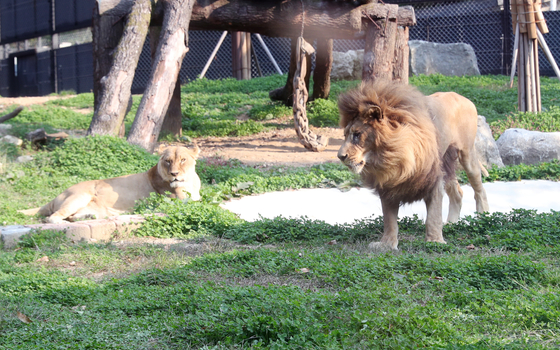![Nineteen-year-old lion Baram, right, is introduced into the same enclosure as 12-year-old lioness Dodo at Cheongju Zoo in North Chungcheong on Oct. 23. [CHEONGJU ZOO]](https://news.myworldfix.com/wp-content/uploads/2023/12/bf9b5161-e6df-469c-96d3-20e4a14e5133.jpg)
Nineteen-year-old lion Baram, right, is introduced into the same enclosure as 12-year-old lioness Dodo at Cheongju Zoo in North Chungcheong on Oct. 23. [CHEONGJU ZOO]
Cafes featuring wild animals such as raccoons are set to become a thing of the past after the Cabinet approved new regulations mandating that businesses obtain zoo permits to rear and exhibit wildlife.
On Tuesday, the Environment Ministry announced that the Cabinet had adopted amendments to enforcement decrees governing the Act on the Management of Zoos and Aquariums and the Wildlife Protection and Management Act.
Under the changes, zoos and aquariums are required to demonstrate that they are equipped with facilities resembling the natural habitats of their wildlife and regularly provide them with their natural diet in order to put them on display for visitors.
Previously, zoos and aquariums were only required to possess basic exhibition and living quarters for their wildlife.
With the shift to a permit-based system, such businesses will now need to receive animal exhibition permits that will be granted only after they prove they can appropriately care for the animals in their custody.
“In the future, the requirements to display wildlife will become more stringent to ensure that businesses that exhibit animals are rearing them in appropriate settings and have safety protocols in place,” the ministry said.
Under the new regulations, businesses are also required to submit plans specifying how they plan to manage the animals in their care, and also tailor their animal accommodation to each species.
Establishments currently displaying animals have a grace period of five years to comply with the new regulations and obtain an exhibition permit.
However, cafes where patrons can interact with animals normally found in the wild, such as raccoons and meerkats, are due to be banned entirely by 2027 under the new regulations.
Current wildlife cafes are required to formally obtain permission to operate as zoos or else shut down before the end of the four-year grace period given to such businesses.
By the end of that period, it will also become illegal to pet, ride or interact with animals in ways that could cause them stress. Violations will be subject to a minimum fine of 1.5 million won ($3,000) per infraction, with a maximum fine of 5 million won.
Wild animals imported as pets by individuals will also be subject to a new nationwide wildlife registration system from Dec. 14, with some species requiring a license in addition to registration.
Previously, the import of non-endangered wild animals was only subject to approval by local government authorities.
The regulatory changes to wildlife protection laws came after a 19-year-old lion named Baram was dubbed the “the ribbed lion” in local media reports after growing emaciated during his eight-year captivity inside a cramped enclosure in Gimhae, South Gyeongsang.
Baram was moved in July to Cheongju Zoo, where he gained over 10 kilograms (22 pounds) in weight and spends time in a 1,000-square-meter (10,763-square-foot) enclosure with a 12-year-old lioness named Dodo.
BY MICHAEL LEE [[email protected]]
